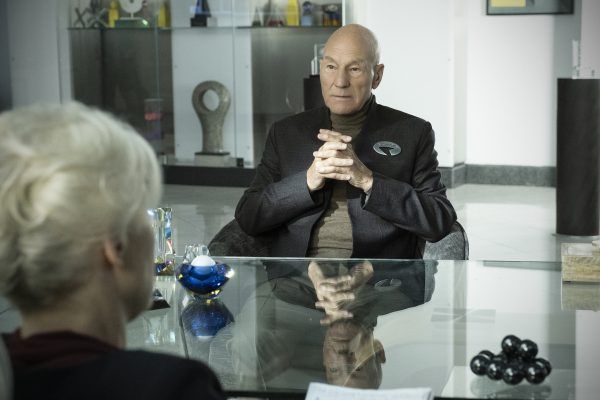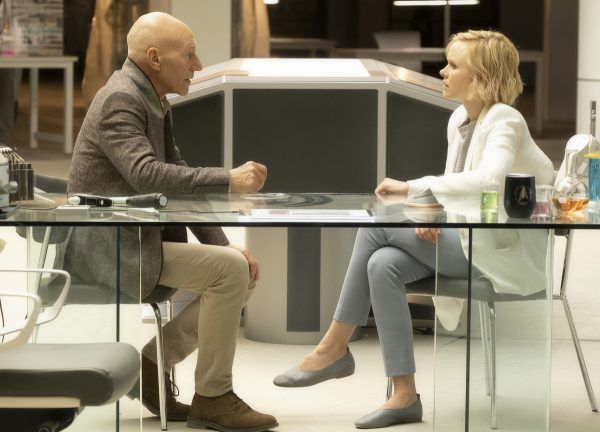Be aware there are full spoilers for 'Star Trek: Picard' Episode 1, “Remembrance”
25 years after Star Trek: The Next Generation went off the air with its gorgeous finale “All Good Things,” Patrick Stewart’s Jean-Luc Picard is back in action in CBS All Access’ Star Trek: Picard. It’s a risky move, bringing a character as universally beloved as Picard back to series after an ending that perfect. It’s not the first time we’ve seen the character since; he appeared in numerous Trek films following TNG‘s finale, but they all felt contained and, to a certain extent, isolated from the series. With Picard, Stewart is back at the helm of a new Star Trek series, and far from clinging to nostalgia plays and safe bets, the new ten-episode series is a bold swing towards a new vision for the character that’s also an obvious love-letter to his and the Star Trek legacy.
When we first catch up with Jean-Luc in the timeline of Picard, he’s playing a quiet round of cards with his most trusted old friend, the synthetic Data (Brent Spiner) while “Blue Skies” croons in the background. But as anyone who’s kept up with the Trek films could tell you and as Picard is quick to inform us, it’s little more than a haunted remembrance, the dream of an old man who, for all his great deeds, is weary with grief and regret. Data is dead. He sacrificed himself to save Picard’s life at the end of 2002’s Star Trek: Nemesis. And when Jean-Luc wakes up, we find him living out his retirement at his winery in France with only his Romulan housekeepers and his dog, Number One, to keep him company.
That’s a lot of loving references in one opening scene – Data sang “Blue Skies” at Riker and Troi’s wedding in Nemesis, the excellently-named Chonky Boi Number One needs no explaining, and “All Good Things” said a loving farewell to Picard and his crew when the captain finally sat down for a long overdue hand of poker – it sets the stage for a series that is equally invested in honoring the past with non-obstreperous moments of well-executed fan service while also imagining something entirely new for Picard.
In his long tenure as the much-beloved character Stewart gave one of the great leading performances in TV history and the actor-character combo remains an absolute joy to behold on screen, as dignified and charismatic as he ever was, somehow able to deliver his words of comfort and confidence in the good of mankind without making it sound over-earnest or like hippie-dippie “love and flowers” wishful thinking. When Jean-Luc Picard tells you humanity can be better, you believe him. And those who delight in Stewart’s on-screen charms (which is to say everyone) will find plenty to cherish in Picard’s opening scenes, as everyone’s favorite space-dad pals around with his Very Good Dog, speaks french, and immediately reminds you what a treasure he is.
But where Jean-Luc has remained the upstanding man we all know and love, the galaxy has changed around him. Long-retired from Star Fleet, Picard lives the quiet life at Chateaux Picard. But when a journalist drops by for an interview, we quickly learn just how much Picard’s world has changed. Delivered a tense and tightly-scripted exchange between the two, Picard unfolds the necessary history of the Trek world since Nemesis. And reveals the scope of the series ambitions.
In a bold choice, the Picard writing team (which includes novelist Michael Chabon, Akiva Goldsman, Star Trek ‘09 writer and Discover co-creator Alex Kurtzman, and Discovery co-writer Kristen Beyer) opts not to skirt the events of Nemesis or the reboot film franchise, but embrace them. Though Picard is said to be set firmly in the so-called “Prime” timeline (as opposed to the “Kelvin” timeline established in J.J. Abrams’ film,) the series embraces the Romulus Supernova – the key event chronicled in the reboot franchise. Over the course of a quick conversation, Picard knocks out a whole heap of exposition that brings the audience up to speed, ignites the curiosity of fans, and avoids feeling cursory by rooting it in Stewart’s performance as he registers every blow while they recount the tragic past.
During the course of the interview, we learn that Picard convinced the Star Fleet to enact a massive rescue and relocation of the Romulans – a race seen as “the Federation’s oldest enemy” – and left the Enterprise to oversee the mission. And while he stands by every one of his choices, they have not aged well with the public after a terrorist attack by a group of rogue synthetics destroyed the rescue armada and set Mars aflame by hacking their defense system, costing some 90,000 lives. In this new world of Star Trek, synthetic life forms are illegal, Romulans are unwelcome refuges, and Picard has fallen out of step with a society he no longer believes righteous. When the journalist presses on why he resigned from Star Fleet, Jean-Luc firmly proclaims, “Because it was no longer Star Fleet!” He sees their decision to withdraw following the attack dishonorable and criminal, and we find that the one-time leader for the future of the human race has lost faith.
With that, Picard is poised to become the most political installment in a franchise that has always kept its eye on a progressive message of hope for humanity. Star Trek has always been a vehicle for timely narratives, but with Picard’s push into more modernized TV writing, with a tightened-episode run and serialized narrative, it’s themes of humanitarian values, corruption in power, and refugee crisis feel more central to the storytelling than ever. At its core, Picard represents a fundamental shift: last we saw Picard, he was a noble leader and a man of great power in a system he believed in, in Picard, he’s an outsider and underdog fighting to bring honor back to a society that’s lost its way.
That’s one of the key elements that makes Picard such a pivot for the character, but it's far from the only one. Despite the regular doses of callbacks (of note, B-4 gets a late-episode cameo), Picard feels like a re-birth, tonally, texturally and narratively. Some of that comes from that aforementioned drive towards condensed, serialized storytelling and the way that strips Picard of TNG‘s most familiar charms.
Long gone is the space adventure of the week format, there are surprisingly few alien species to spot in the premiere, and while Picard is no doubt about to assemble a team to journey off to some heroic mission to save the galaxy, he never even steps foot on a spacecraft in the first episode. Without the typically everpresent Star Fleet uniforms, the communicators and docking scenes, not to mention Picard’s calm battle orders from the command deck or his witty banter with his crew members, Picard can’t quite be called a return to form, but a step towards something new, built on the backbone of knowing that seeing Jean-Luc on-screen again will feel like going home no matter how unfamiliar the setting.
Picard also looks completely new. The series benefits from an obviously robust production budget that captures Stewart in some of the loveliest lightings to grace his iconic visage in Picard’s long history. And while there are no great space battles in “Remembrance”, no doubt they will be impressive based on the quality and intensity of the few action beats we do get in the mostly Earth-bound episode.
The series generally pulls off the transition, but the downside of all this “new and improved” energy is a premiere episode that’s stuffed with heaping amounts of expository dialogue and very little action. Generally, the information-fueled dialogue is well-handled, delivered in emotionally rich scenes like the combative interview, but sometimes “Remembrance” from a bit of drag. At the same time, it’s rather lovely how it takes time for moments of quiet and reflection in this distinctly more melancholy take on Picard.
However, that’s not to say Picard leaves behind what we love about the character’s legacy. Which brings us back to Data and leads us to a few of the key new characters joining Picard on his new adventure. Foremost among them is Dahj (Isa Briones), a young woman we meet enjoying a quiet night with her boyfriend when she’s attacked by a group of teleporting assassins. They make quick work of killing her boyfriend, but Dahj isn’t your average mark, and when she’s attacked, she unleashes a torrent of ass-kicking, discovering new abilities she never knew she had. In short order, she tracks down Picard, who quickly discerns she’s connected to Data thanks to an old painting from his long-lost friend. Titled “Daughter,” the painting is of a woman who looks just like Dahj.
And then Picard throws us for a loop as soon as we think we have a handle on where this is going. Picard reveals the truth to Dahj, telling her “you are dear to me in ways that you can’t understand.” Dahj struggles with the truth of what she is, but they make a plan. He promises never to leave her. And then… Dahj dies. The assassins attack again and she fights to protect Picard in an impressively-choreographed, Black Widow-esque fight scene. And she dies right in front of him. Just like Data did.
Picard awakes with all evidence of Dahj’s death wiped clean and travels to the Daystrom Institute (one of the last places specializing in robotics and synthetics) in Japan for answers, where he meets Doctor Anges Jurati (Alison Pill), who immediately insists a sentient synthetic made of flesh and blood couldn’t exist. Then quickly comes around to believing Dahj is a miraculous invention. Most importantly, she reveals that Dahj is a twin. There's another. Thanks to Dahj’s necklace, which Dr. Jurati recognizes as a symbol that represents “fractal neuronic cloning.” Basically, that means Dahj was created from Data, and that a part of him may live on via “positronic neuron” in his daughters (knowledge of vital importance to Picard) and that these synthetics are created in pairs (knowledge of vital importance to the plot.)
And that’s when Picard delivers a bang-pow nerd-out conclusion to its premiere. For the first time, “Remembrance” leaves Earth and the scene cuts to a ship soaring into a Romulan Reclamation Site. That’s where we find Dahj’s twin, Dr. Soji Asher, who spends her days “fixing broken people” on… what pulls back to reveal the Romulan Reclamation site is a Borg cube. Or a Borg cube in progress? It’s not entirely sure, but that reveal is a massive exclamation point on the episode that promises exciting new directions for the mythology of the series. The Borg weren’t even mentioned by name in the episode, so it’s a wild reveal to toss in at the end, but it makes sense, and again, points to an approach to the series that keeps an eye on the entirety of the Star Trek franchise.
Nero, the villain in 2009’s Star Trek, used Borg technology to enhance his ship and while we don’t know exactly how the Romulans are in business with the Borg, but we do know that they’re a people without a planet, largely unwelcome in the Federation, who may have needed to find a new way to survive in the universe. And we know that Jonathan Del Arco’s Hugh (who previously appeared in the TNG episode “I, Borg”) is returning as a disconnected Borg that promises an entirely new take on the hive mind species.
Overall, Picard delivers an imperfect but incredibly promising premire episode with “Remembrance,” saddled by the demands of bringing audiences new and old up to speed with decades of Trek history, but abundantly loving toward that history and rooted in a triumphant return for Stewart, who remains as commanding as ever. And that loving element really can't be understated; the callbacks aren't just empty fan-service, they're rooted in the construct of the show. The very idea of Data's desire to have a daughter is rooted in one of TNG's most touching episodes, "The Offspring". That kind of shared affection can go a long way when it comes to getting an audience to go with you on a new journey.
It is no doubt heavy on the mystery-building. (What’s up with that Borg/Romulan situation? Who’s this guy chatting up Soji at the end? Why did seemingly Romulan assassins murder Dahj when her twin works in one of their reclamation sites? Where is that tech guy Picard and Agnes kept talking about, and can Picard bring Data back with the help of the essence his daughter bears?) But there’s a sense that Picard is meticulously setting up a series of intriguing dominos, and when they start to fall (and with Season 2 already in the works, oh they will fall,) this could be a very unique, timely, and deeply nerdy adventure for a character that’s been a moral compass for generations.
"I haven't been living, I've been waiting to die," Jean-Luc says during the episode, and while there's no denying that Picard starts from an unfamiliar and uncharacteristically dark place, watching this character find his way back to the light could be a heck of a powerful balm in trying real-world times that feel far more relatable to the world he finds himself in now than the one we knew him from before.
Rating: ★★★





